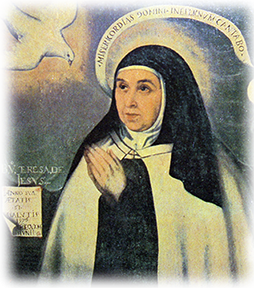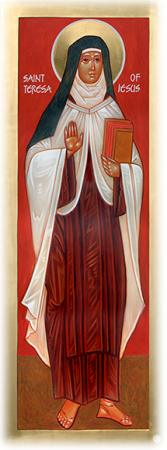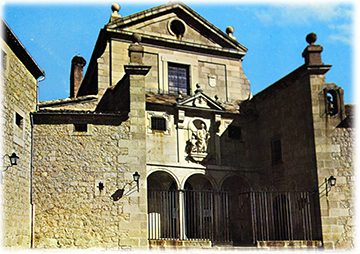
Saint Teresa
of Avila
Let nothing disturb you. Nothing frighten you. All things are passing. God is unchanging. Patience gains all. Nothing is lacking to those who have God. God alone suffices.
LOVE AND ARDOR, graciousness and strength, determination and peacefulness- these are some of the characteristics of Teresa de Cepeda y Ahumada, daughter of Don Alonso Sanchez y Cepeda, and Dona Beatriz de Ahumada, minor nobility of the Province of Castile, Spain.

Born in Avila, a fortressed town of knights, famous for their valor and skill in war, their Castilian honor, their fierce loyalty and love of freedom, Teresa was the fifth child in a family of eleven, and came into the world on March 28, 1515, into a well-to-do merchant family. It seems likely that her grandfather had originally been Jewish but had converted to Catholicism in order to rise in society, Jews at that time being excluded from the mixing with those who ranked as the minor nobility. Her father, Alonso de Cepeda, whose favorite she was, being widowed two years after his first marriage, married Dona Beatriz de Ahumada and Teresa was the first child of this marriage which produced ten children. Teresa lost her mother when she was only fourteen, and she prayed before a statue of the Blessed Virgin begging her from then on to take the place of her own mother whom she had just lost.

St. Teresa's signature
Her works:
The Book of Her Life
The Way of Perfection
The Interior Castle
The Foundations
![]()
In the measure you desire Him you will find Him.
Love is always stirring and thinking about what it will do. It cannot contain itself...
The Lord doesn't look so much at the greatness of our works as at the love with which they are done!
The measure for being able to bear a large or small cross is Love.
... in order to ... ascent to the dwelling places we desire, the important thing i snot to think much but to love much: and so do that which best stirs you to love.
I hold that Love, where present, cannot possibly be content with remaining always the same.
![]()
Love turns work into rest.
An extremely intelligent and lively child, Teresa was always the leader when the children were at their games, but there was also a devout and religious side to her character. Doubtless, she was influenced by the example of her exemplary parents. When Teresa played with her friends, they had to play at being hermits or nuns; there is no doubt that Teresa herself would have been the Prioress!
When she grew into her teens Teresa tells us that she lost her attraction to her piety and good habits and like many girls in their teens, she became taken up with ‘vanities,’ fashion and the sort of frivolous friendships that appealed to girls of her age. As a result of this her father decided to send her to a boarding school run by nuns.
At first Teresa was sorry to have her freedom curtailed in this way. She was always afraid that people would think that her father had sent her to the convent school because her of her flirtatious behavior. However, after a while she began to appreciate the peace of the convent and the goodness of the nuns, especially the one who showed her special kindness and whose good influence helped her to regain her love of spiritual things.
At the age of twenty-one, because her father would not give his consent for her to enter the Carmelite convent in Avila, Teresa ran away from home one day and entered the convent without his permission. She forced herself to do this despite her great love for her father, for it seemed to Teresa, that if she did not try and make amends for her frivolous life and the way she had misused the graces God had given her, she might not be saved. However, once she had made her decision to enter the cloister and had become a nun, her heart was filled with joy and peace. God showered great graces of prayer on her and within a short time was experiencing mystical prayer.
when I was experiencing the enjoyments of the world, I felt sorrow when I recalled what I owed to God. When I was with God, the attachments of this world disturbed me. This was a war so troublesome that I am amazed that I endured it for a month let alone for so many years.
Since Teresa was destined to be God’s instrument in serving the Church during this time when it was experiencing the crisis of the Protestant Reformation, God had to prepare her soul by many sufferings and trials. Shortly after entering the convent, Teresa fell gravely sick (we do not know what the illness was) but for three years Teresa suffered paralysis and agonizing pains. The doctors had no remedy and she returned to her monastery more dead than alive. In this trial Teresa turned to St. Joseph begged him to obtain a cure. She had always been devoted to him but after he answered her prayer so that she was able to resume her life in her monastery, Teresa never lost an opportunity to tell others of the great advantages of being devoted to St. Joseph. It is partly due to her that devotion to the Foster Father of Jesus became universal throughout the Church. All during these years of her illness Teresa had suffered with amazing patience. Her health was restored sufficiently for her to continue her life as a nun at the monastery of the Incarnation, though she continued to suffer from very poor health throughout her life. Teresa thought that once she had regained her health she would be able to do more for God. However, as regards serving God, sadly, Teresa fell little by little into small temptations so that her heart was divided. She was extremely gifted with charm, and intelligence, a great conversationalist so that people were drawn to her. So it was that she began to spend more and more time in the parlor talking to the high society ladies of Avila.

Yet at the same time she felt Our Lord calling her, and in her heart when at prayer she knew she was being ungrateful to Him who had given her so many special graces. Teresa said in "The Book of her Life," when I was experiencing the enjoyments of the world, I felt sorrow when I recalled what I owed to God. When I was with God, the attachments of this world disturbed me. This was a war so troublesome that I am amazed that I endured it for a month let alone for so many years." Finally, after twenty years when she had finally learnt to put her trust in God’s grace alone, He enabled her to give herself totally to His service; this was her second conversion. From then on, flooded by God’s merciful grace, advanced swiftly on the path to mystical union with God. She was always desiring to do greater things for Him and it seemed to her that Christ was being crucified again in His Mystical Body through attacks being made on the Church by heretics who profaned the Blessed Sacrament and the Mass.
While she was in prayer one day Christ told her that He wanted her to found a monastery under the patronage of St. Joseph. For some time Teresa and a small group of her friends had been wondering how they could found another monastery where they could live a life of prayer and contemplation like the early hermits on Mount Carmel. Because there were one hundred and eighty nuns at the convent of the Incarnation and there was scarcely enough money for food, the popular nuns (and Teresa was the foremost of these) were encouraged and even ordered to accept invitations from wealthy benefactors in order that there should be fewer mouths to feed.

However, Teresa knew that wanting this ideal monastery was one thing but founding it was another. She had sufficient wisdom to realize that this project would bring with it every kind of trial and humiliation but she knew also that this was Our Lord’s wish for while she was at prayer, He had told her to begin. Teresa had no material resources, only Our Lord’s promise, a small group of nuns and one lay person who supported her. A very large number of nuns vehemently opposed her from the beginning to the end, especially the nuns from her own convent. Teresa, with courage and determination, persevered in her work and, on the feast of St. Bartholomew in 1562, the bell for Mass rang in the chapel of the little Carmel of St. Joseph in Avila.
Before Teresa died, the Nuncio granted that the Discalced Nuns and Friars should be separated from all jurisdiction by the Calced . She also was successful in having the Constitutions for the Order of Discalced Carmelites drawn up, printed and approved. She had finished the work God gave her to do.
